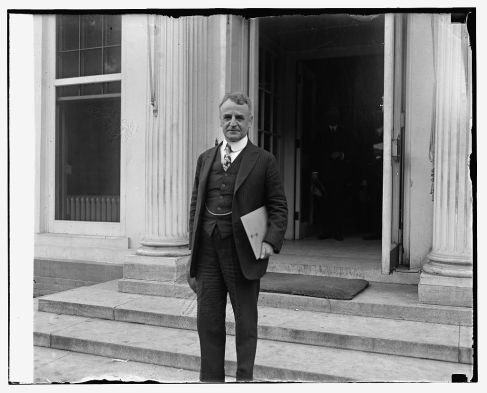Dwight Morrow, Amherst classmate and one of Coolidge’s earliest supporters, was mistakenly assumed to be among a small, select group of close advisers to the President. He, like Stearns (and nearly everyone else considered “close”) was kept at a distance because Coolidge respected their abilities but knew that the final decision rested with him alone. Coolidge would not entertain favoritism nor allow the perception that he was appointing “friends” to positions over considerations of merit. That is why he refrained from using Morrow’s great abilities for years. When he did appoint Morrow, it was to seemingly insignificant and temporal tasks, such as an Aeronautics Defense Commission or as Ambassador to Mexico. In each case, Morrow acquitted himself better than before. In the process, he established a reputation of sound judgment, unimpeachable character and preparedness for the next task. He was loyal all of his life to Coolidge. In one of the few conversations he had with “Calvin” in college, the future president told him something he never forgot and to which he aspired the rest of his life,
“One should never trouble about getting a better job. But one should do one’s present job in such a manner as to qualify for a better job when it comes along (Nicholson, ‘Dwight Morrow: A Biography,’ p. 87).”
Morrow would keep that perspective with him, even seeing it manifested in Coolidge’s incredible rise. When a friend expressed his amazement at what has been called “the Coolidge luck,” Coolidge’s rising to top positions by sheer “good fortune,” Morrow retorted, “but, he always reaches the second place by sheer merit.” Writing to the new President immediately upon hearing of Harding’s death, he said,
“Three years ago in Worcester I told you in all sincerity that I was convinced that you were better equipped in character and in training to serve this nation as its President than any of the other possible candidates that were being discussed. That conviction was based upon your character as I knew it and your long training in public affairs. I have never changed that belief. The greatest responsibility that rests upon any man in the world has now come to you. No former Vice President who succeeded to the Presidency by the death of the President was confronted with responsibilities as great. Your whole life’s training fits you for your mighty task; and the faith that you expressed in the closing line of your short statement made in Vermont is the faith that all your real friends will share…”
Similar to Coolidge, Morrow was inspired to public service by Professor Garman at Amherst. Morrow would be a competent observer of people all of his life. He was not far behind Frank W. Stearns in seeing more to Coolidge than most did. Coolidge, as he prepared to leave the Presidency, would give his finest tribute of Morrow’s abilities by recommending to Herbert Hoover that Morrow become the next Secretary of State. Coolidge would never interject his preferences on Hoover, save this one time. The fact that it was for Morrow speaks volumes. It underscored the sharp differences between Coolidge and Hoover that the latter imprudently refused.
Years before, however, Morrow would try to explain himself to Stearns before giving some advice he knew Stearns could relay to Coolidge, “You may look upon me, because of my associations, as a conservative, but I really think I have been all my life something of a radical. I have tried, of course, to be radical along lines that would help instead of along lines that would simply throw the existing machinery out of gear.” A reminder to many a modern “activist” that one does not need to “scrap the foundations” to best improve current conditions. Morrow continued, explaining to the businessman, that there are two basic types of people, in a way far more fundamental than Party allegiance or even political alignment,
“For the last year I have been abroad dealing with all sorts of government officials. Some of them have been Socialists like [Albert] Thomas, the great Socialist leader in France. Some of them have come from old conservative families, like Lord Robert Cecil, son of the Marquis of Salisbury. I have about come to the conclusion that the division of the people of the world is not really between conservative and radical, but between people that are real people and people that are not. Calvin is one of the fellows who is real. He really wants to make things better, not to pretend to make them better…” (Nicholson 231).
Dwight W. Morrow in 1925. His sudden death in the fall of 1931 would be a profound loss to the country, and lay an even heavier grief upon one of his oldest friends, Calvin Coolidge.
